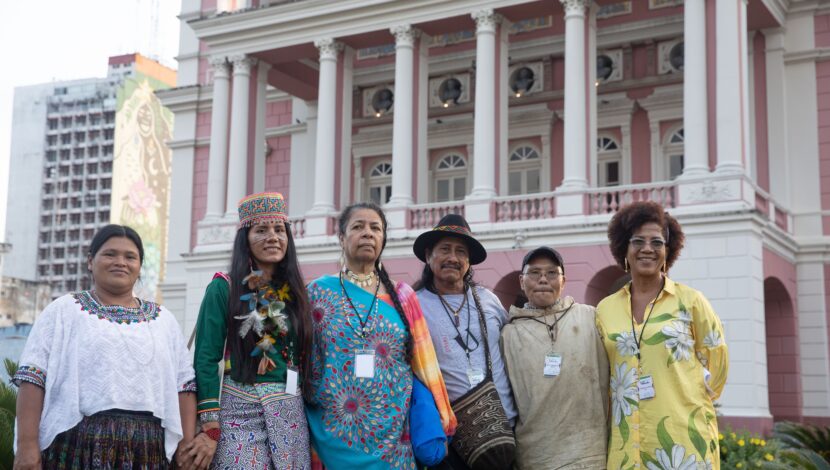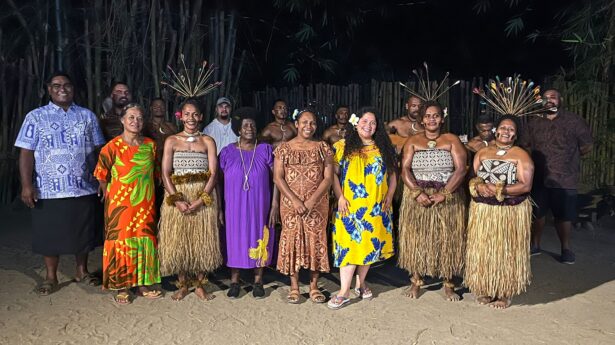The Unitarian Universalist Service Committee advances human rights through grassroots collaborations.
UUSC Partners Testify at Historic Hearing on the Climate Emergency

By Josh Leach on June 6, 2024
It’s no small jaunt to get from Louisiana or Alaska to Manaus, Brazil. Yet, three Indigenous leaders and longstanding UUSC partners—Elder Rosina Philippe and Brandy Bartholomew of Louisiana’s Atakapa Ishak Chawasha Tribe and Morris Alexie of the Nunapitchuk Alaska Native village—recently made this journey in order to tell the world the truth about the climate emergency.
The events in Manaus were part of a series of public hearings held before the Inter-American Court of Human Rights (IACHR): a continent-spanning tribunal dedicated to upholding human rights throughout the Americas. The first set of public hearings were held in Barbados in April. UUSC’s partners spoke before the second set, which took place in Brazil over the last two weeks of May.
The IACHR’s mandate embraces the whole of the Americas—and our partners had to cross practically that same distance to get there. For our partner from Nunapitchuk, Morris Alexie, it was the first time he had traveled outside the United States. Both he and Elder Rosina Philippe had to travel thousands of miles in order to bear witness before these hearings—showing the scale of their dedication to seeking justice for their communities.
The village of Nunapitchuk, like several other Alaska Native communities, has faced devastating impacts from the climate crisis already. Human-induced global heating has undermined the permafrost that sustains much of the Arctic ecosystem, causing erosion and even raising the specter that entire villages might sink into the ground. These climate impacts—which Alaska Native villages themselves did nothing to cause—are already forcing people to relocate.
With only two minutes to speak before the public hearing, Morris Alexie described the harrowing situation facing his community and called for urgent action. In his words, he spoke about “the climate crisis affecting our whole community, and how our U.S. government is slow to respond to our communities’ plea for better ground to make a healthy living.”
He also addressed the fact that the State of Alaska has been slow to acknowledge the sovereignty of its Indigenous inhabitants, pointing out that it “has finally recognized us, the Alaska Natives just a few years ago.”
The purpose of both sets of public hearings—in Barbados and Brazil—was to discuss the need for a legal Advisory Opinion setting out governments’ obligations to address the climate emergency. Human rights advocates across the globe—including several of UUSC’s partners—have had success recently in pushing for similar legal rulings from other world courts.
The UN General Assembly, for instance—at the instigation of UUSC’s partners in the Pacific and other activists—passed a historic resolution last year calling for an advisory opinion from the International Court of Justice, addressing states’ obligations for their role in the climate crisis. Similarly, the world’s highest maritime court—the International Tribunal for the Law of the Sea—issued a ruling two weeks ago telling governments to knock off carbon emissions that are poisoning and destroying the world’s oceans.
A similar ruling from the IACHR would add still further to the impact of these recent opinions. It would show governments and big polluters that there is nowhere to hide from their human rights obligations. They must address the impacts that carbon emissions and global warming are already having on communities throughout the Americas—especially Indigenous communities, who are often on the front lines of these changes.
Encouragingly, the IACHR’s new Special Rapporteur on Economic, Social, Cultural and Environmental Rights (REDESCA) has already lent his voice in support of an advisory opinion, in the wake of the public hearings—just as we hoped he would do.
The impact of these testimonies was felt firsthand by our partners who spoke at the hearing. Elder Rosina Philippe described her experience:
My experience was one of solidarity…Indigenous knowledge holders/leaders of different territories from around the globe came together to share one resounding themed story, “our climate is in crisis, we…as a global family need to make changes on how we live on this planet, NOW!
Indigenous voices are sounding the warnings, as a global population we cannot afford to allow the will of a few to continue to control and determine the future of us all. Failure to act now makes me shudder to imagine what the future will be.
I hope the IACHR heard us, I hope they listened, I hope they act! I had 2 minutes to convey generations of environmental neglect and harm. Harm that is leading to genocide of life worlds and lifeways.
The stakes are indeed this high. Indigenous communities at the forefront of the crisis are facing the loss and erasure of their homes, cultures, and very existences. Our continent cannot afford to wait. The IACHR should issue an Advisory Opinion ASAP.
UUSC members can support this cause by signing up to learn more from our email list. Subscribers to the list will receive regular updates on our work for climate justice and other human rights issues. You can also make a donation to support UUSC. Every contribution helps us flank our partners’ work to advance global solidarity.
Image credit: EarthRights International

